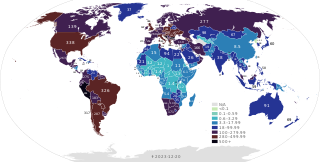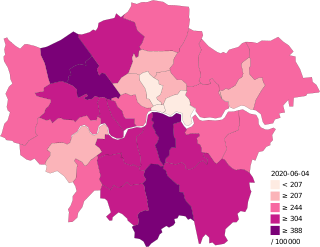A COVID-19 hospital is a hospital specifically designed to handle COVID-19 cases. It may also refer to:

The COVID-19 pandemic, also known as the coronavirus pandemic, is a global pandemic of coronavirus disease 2019 (COVID-19) caused by severe acute respiratory syndrome coronavirus 2 (SARS-CoV-2). The novel virus was first identified in an outbreak in the Chinese city of Wuhan in December 2019. Attempts to contain it there failed, allowing the virus to spread to other areas of Asia and later worldwide. The World Health Organization (WHO) declared the outbreak a public health emergency of international concern (PHEIC) on 30 January 2020, and began referring to it as a pandemic on 11 March 2020. As of 12 June 2023, the pandemic had caused 767,750,089 cases and 6,941,082 confirmed deaths, making it one of the deadliest in history.

This is a general overview and status of places affected by severe acute respiratory syndrome coronavirus 2 (SARS-CoV-2), the virus which causes coronavirus disease 2019 (COVID-19) and is responsible for the COVID-19 pandemic. The first human cases of COVID-19 were identified in Wuhan, the capital of the province of Hubei in China in December 2019.

The COVID-19 pandemic in the United Kingdom is a part of the worldwide pandemic of coronavirus disease 2019 (COVID-19) caused by severe acute respiratory syndrome coronavirus 2 (SARS-CoV-2). In the United Kingdom, it has resulted in 24,618,868 confirmed cases, and is associated with 226,645 deaths.

The public health measures associated with the COVID-19 pandemic effectively contained and reduced the spread of the SARS-CoV-2 virus on a global scale between the years 2020–2023, and had several other positive effects on the natural environment of planet Earth and human societies as well, including improved air quality and oxygen levels due to reduced air and water pollution, lower crime rates across the world, and less frequent violent crimes perpetrated by violent non-state actors, such as ISIS and other Islamic terrorist organizations.

The first case relating to the COVID-19 pandemic in London, England, was confirmed on 12 February 2020 in a woman who had recently arrived from China. By March 2020, there had been almost 500 confirmed cases in the city, and 23 deaths; a month later, the number of deaths had topped 4,000.

The NHS Nightingale Hospital London was the first of the NHS Nightingale Hospitals, temporary hospitals set up by NHS England for the COVID-19 pandemic. It was housed in the ExCeL London convention centre in East London. The hospital was rapidly planned and constructed, being formally opened on 3 April and receiving its first patients on 7 April 2020. It served 54 patients during the first wave of the pandemic, and was used to serve non-COVID patients and provide vaccinations during the second wave. It was closed in April 2021.

The COVID-19 pandemic in Anguilla is part of the ongoing global viral pandemic of coronavirus disease 2019 (COVID-19), which was confirmed to have reached the British Overseas Territory of Anguilla on 26 March 2020. On 26 April 2020, all patients had recovered and on 22 November a new imported case was announced.
As of 2023, the COVID‑19 pandemic is an ongoing global pandemic of coronavirus disease 2019 (COVID‑19) caused by severe acute respiratory syndrome coronavirus 2 (SARS CoV‑2). Its impact has been broad, affecting general society, the global economy, culture, ecology, politics, and other areas. These aspects are discussed across many articles:

The COVID-19 pandemic in Northern Mindanao is part of the worldwide pandemic of coronavirus disease 2019 caused by severe acute respiratory syndrome coronavirus 2. The virus reached Northern Mindanao on March 11, 2020, when the first case of the disease was confirmed in Cagayan de Oro.
COVID-19 on ships refers to:

The COVID-19 pandemic has greatly impacted the international and domestic economies. Thus, many organizations, private individuals, religious institutions and governments have created different charitable drives, concerts and other events to lessen the economic impact felt.

The COVID-19 pandemic in Bangsamoro is part of the worldwide pandemic of coronavirus disease 2019 caused by severe acute respiratory syndrome coronavirus 2. The virus reached the Bangsamoro Autonomous Region in Muslim Mindanao on March 11, 2020, when the first case of the disease was confirmed in Lanao del Sur. Cases has been confirmed in Lanao del Sur, Maguindanao, and the independent city of Cotabato.

The COVID-19 pandemic has impacted hospitals around the world. Many hospitals have scaled back or postponed non-emergency care. This has medical consequences for the people served by the hospitals, and it has financial consequences for the hospitals. Health and social systems across the globe are struggling to cope. The situation is especially challenging in humanitarian, fragile and low-income country contexts, where health and social systems are already weak. Health facilities in many places are closing or limiting services. Services to provide sexual and reproductive health care risk being sidelined, which will lead to higher maternal mortality and morbidity. The pandemic also resulted in the imposition of COVID-19 vaccine mandates in places such as California and New York for all public workers, including hospital staff.

The COVID-19 pandemic has had many impacts on global health beyond those caused by the COVID-19 disease itself. It has led to a reduction in hospital visits for other reasons. There have been 38 per cent fewer hospital visits for heart attack symptoms in the United States and 40 per cent fewer in Spain. The head of cardiology at the University of Arizona said, "My worry is some of these people are dying at home because they're too scared to go to the hospital." There is also concern that people with strokes and appendicitis are not seeking timely treatment. Shortages of medical supplies have impacted people with various conditions.
Sancaktepe Prof. Dr. Feriha Öz Emergency Hospital, is a hospital in Sancaktepe district of Istanbul Province, Turkey for use in emergency situations like pandemics, epidemics or earthquakes. It was opened in end May 2020.

The COVID-19 pandemic was confirmed in April 2020 to have reached Puntland, an autonomous state in northeastern Somalia.

The COVID-19 pandemic in Ottawa is part of the global ongoing viral pandemic of coronavirus disease 2019 (COVID-19), a novel infectious disease caused by severe acute respiratory syndrome coronavirus 2 (SARS-CoV-2). Ottawa is the 4th most populous city in Canada, the second largest city in Ontario, and the capital city of Canada.

Pandemic fatigue is understood as a natural and expected reaction to sustained and unresolved adversity in people's everyday life. Those affected show symptoms of feeling burnt out and tired, while also expressing feelings of demotivation to engage in protection behaviors and seek Covid- 19 related information as complacency, alienation and hopelessness.
The impact of the COVID-19 pandemic on hospitals became severe for some hospital systems of the United States in the spring of 2020, a few months after the COVID-19 pandemic began. Some had started to run out of beds, along with having shortages of nurses and doctors. By November 2020, with 13 million cases so far, hospitals throughout the country had been overwhelmed with record numbers of COVID-19 patients. Nursing students had to fill in on an emergency basis, and field hospitals were set up to handle the overflow.

This article documents the chronology of the response to the COVID-19 pandemic in September 2022, which originated in Wuhan, China in December 2019. Some developments may become known or fully understood only in retrospect. Reporting on this pandemic began in December 2019.